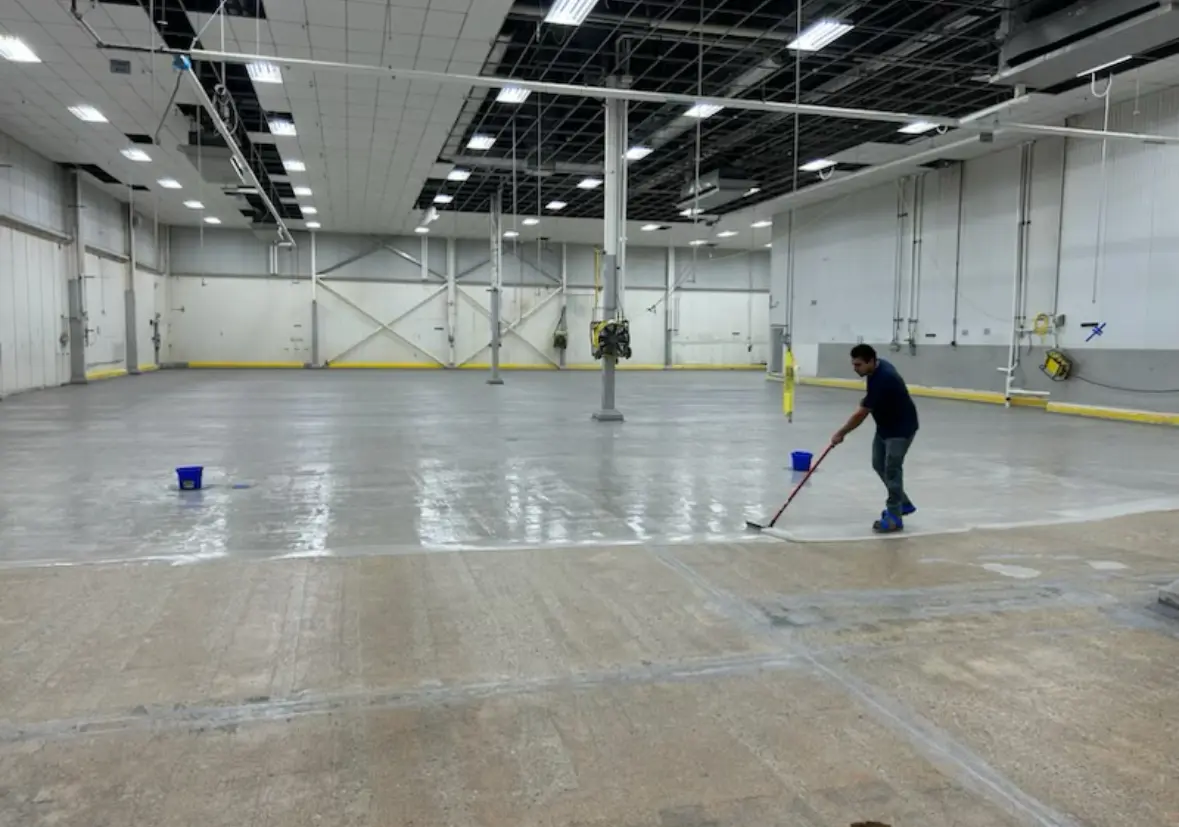Introduction to Industrial Floor Coatings
When it comes to upgrading your business space, picking the right floor coating is more crucial than you might think. These coatings do more than just make the floor look good; they protect it from wear and tear, making your investment last longer. Imagine this – your business floor faces heavy traffic, spills, and all sorts of impacts daily. Without the right protection, it’s going to show signs of damage quickly. Industrial floor coatings come in to save the day, offering durability and resistance against these harsh conditions. From epoxy to polyurethane and acrylic, there’s a variety of coatings each tailored for different needs. Epoxy, for instance, is famous for its toughness and is a go-to for areas with high foot traffic or heavy machinery. On the flip side, if you’re looking for something that cures quickly and offers excellent resistance to chemicals, polyurethane might be your best bet. And for those needing a quick fix with decent protection, acrylic coatings offer a budget-friendly option. So, when you’re deciding on the right floor coating, think about what your business floor goes through every day and choose accordingly. It’s not just about making the floor look good; it’s about making it last.
Understanding Different Types of Industrial Floor Coatings
When you’re looking at industrial floor coatings, think of them as a suit of armor for your floor. Different types have their strengths, ideal for various environments. Epoxy coatings are the heavy lifters, perfect for areas with lots of foot or machine traffic. They’re tough and can handle a lot of abuse, making them a solid choice for factories or warehouses. Polyurethane coatings are the flexible ones in the bunch. They resist scratches and scuffs better than others, so they’re great for places where the floor needs to stay looking sharp, like showrooms or commercial spaces. Polyaspartic coatings are the fast movers. They dry super quick, which means less downtime for your business. They’re a good pick when you can’t afford to have the area out of commission for long. Lastly, acrylic coatings are like the quick fix. They’re not as durable as epoxy or polyurethane but are easy to apply and reapply, making them suitable for places with lower traffic or for temporary solutions. Remember, the right type of coating depends on what challenges your floor faces. Choose wisely to keep your business’s floor protected and looking good.
Factors to Consider When Choosing Industrial Floor Coatings
When you’re diving into the world of industrial floor coatings, it feels like wading through a swamp of options. But relax, let’s break it down to the essentials, making it easy to pick the right flooring for your fortress of commerce. First up, think about what your floor goes through every day. Is it just foot traffic, or do you have heavy machinery roaming around like it’s their playground? This determines the strength of the coating needed. Then, consider the vibe you’re aiming for. Do you want your floor to shout “sterile” like a hospital, or more “welcome to my cozy shop”? The appearance of your floor sets this tone. Next, let’s talk spills. If you’re in an industry where chemicals are as common as coffee spills in an office, you need a surface that won’t throw a fit every time there’s a spill. Now, don’t forget the green aspect. Eco-friendly options are not just good for Mother Earth, they might also save you some green in the long run with lower utility bills or maintenance costs. Finally, what’s your budget looking like? You don’t want to empty your coffers on just the floor. Balance cost with your needs to find your perfect match. In short, sift through your specific needs, the daily beatings your floor will take, its looks, how it reacts to spills, its environmental impact, and how it fits your budget. That’s your roadmap to the right industrial floor coating.
The Role of Durability and Maintenance in Your Decision
When picking the right industrial floor coating, think about durability and maintenance—they’re crucial. Durable coatings survive heavy traffic, machinery, spills, and abrasions. This means less repair and longer life. Yet, durability varies by type. Epoxy, for example, is tough against wear and chemicals—ideal for garages or warehouses. Polyurethane coatings are great for areas with lots of movement, as they’re flexible and resist scratches. Next, consider maintenance. Low-maintenance options save time and money. Epoxy is again a winner here because it’s easy to clean and resists stains. On the other hand, coatings that need frequent reapplication or special cleaning products can add to your workload and expenses. So, weigh durability against maintenance carefully to choose wisely for your business. This decision ensures your floor stays in top shape without unnecessary hassle or cost.
How Chemical and Slip Resistance Affects Your Choice
When picking industrial floor coatings, considering how they handle chemicals and if they prevent slipping is key. Floors in places like factories, garages, and hospitals must resist chemical spills. Imagine dropping a strong cleaner or solvent and it eating away your floor. Not good. Look for coatings that mention chemical resistance. They’re your best bet for long-lasting protection. Now, think about slip resistance. A slippery floor is a recipe for accidents. More so in busy spots where spills are common. You don’t want people slipping and getting hurt. Safe floors also mean fewer worries about lawsuits from accidents. So, when you’re choosing, get a coating that’s got grip. Floors that stand strong against chemicals and keep everyone on their feet are smart choices. Remember, a safe and durable floor is not just about looks, but about keeping operations smooth and people safe.
The Importance of Aesthetics in Industrial Floor Coatings
Looks matter, even for industrial floors. When picking out coatings, keep in mind how the appearance will influence your workspace. Bright and well-maintained floors can boost morale, making your team happier and more productive. It’s not just about looking good for visitors; a floor that reflects professionalism can increase the confidence of your employees in the workplace. Choose colors and textures that not only stand up to the wear and tear of industrial activities but also enhance the overall look of your facility. Go for options that are easy to clean and maintain, so they stay looking great with minimal effort. Remember, the way your floor looks is an extension of your business’s image and ethos.
Cost Analysis: Balancing Quality and Budget
When it comes to choosing the right floor coating for your business, the balance between quality and budget is crucial. Not all coatings are made the same, and the price can vary wildly. On the low end, you might be looking at (2 to )3 per square foot for basic sealers or epoxy coatings. For high-performance coatings designed for heavy industrial use, costs can soar to (5 to )10 per square foot or more. Remember, though, cheaper isn’t always better. While it’s tempting to cut costs upfront, low-quality coatings might wear out quickly, leading to more frequent repairs or replacements. This could actually increase your expenses in the long run. On the flip side, investing in a high-quality coating can save money over time due to its durability and longer lifespan. Think about what your floor will face day-in, day-out. Chemical spills? Heavy traffic? These factors dictate the level of quality you’ll need. The trick is to find the best value—coatings that meet your needs without overshooting on features you won’t use. Sometimes, middle-of-the-road pricing offers the sweet spot between quality and cost, ensuring you get a durable, effective solution without breaking the bank.
Installation Process: What to Expect
Choosing the right industrial floor coating isn’t just about picking colors or materials. It’s a process, and knowing what to expect during installation can make all the difference. First off, the area needs to be prepped. This means cleaning it thoroughly and removing any old coatings or debris. Then, the surface may need repairs. Cracks and chips in your floor? Those get fixed now. Next, the real work starts. The coating is applied. Depending on what you picked, this could be a single layer or multiple ones. Each layer has to dry before the next one goes on, so patience is key. After the final layer, you’ve got curing time. This could be a few hours to several days. During this time, the coating is hardening and turning into that tough, protective layer you need. Last bit? Inspection. You and your installer will check out the new floor, making sure everything’s up to snuff. So, when planning for industrial floor coating installation, factor in preparation, repair, application, drying, curing, and inspection times. It’s not just a day’s job but the outcome? Worth it.
Long-Term Benefits of Selecting the Right Coatings
Selecting the right industrial floor coatings isn’t just about the immediate look and feel. It’s an investment in your business’s future. The right coatings can significantly reduce maintenance needs, thanks to their durability. Imagine spending less time worrying about wear and tear and more on your business operations. Plus, they can boost safety by providing better grip and resistance to slips and falls, a critical feature in any workplace. Energy savings is another key benefit, as some coatings reflect light better, brightening up spaces and slashing lighting costs. In essence, picking the correct coatings means less spending on repairs, enhanced safety for employees, and potential savings on energy bills. It’s a win-win-win situation.
Summary and Recommendations for Choosing Industrial Floor Coatings
Choosing the right industrial floor coatings is not as daunting as it might seem. First, consider your business’s needs. What kind of traffic does your floor handle? Heavy machinery or foot traffic? And don’t forget chemicals. Will there be spills? Next, think about longevity and maintenance. How often do you want to redo your floors? Good floor coatings can last, so pick wisely. Now, let’s talk money. Quality matters, but so does your budget. Balance is key. Some coatings are more cost-effective in the long run. Ready for the specifics? Here are our top recommendations. Epoxy is great for durability and resisting chemicals. It’s a go-to for many. Polyurethane is another strong choice, especially if you’re worried about UV damage and flexibility. Lastly, consider acrylics for a quick fix and easy application. It’s about matching your needs with the right product. Keep these points in mind, and you’ll navigate the world of industrial floor coatings with confidence.



